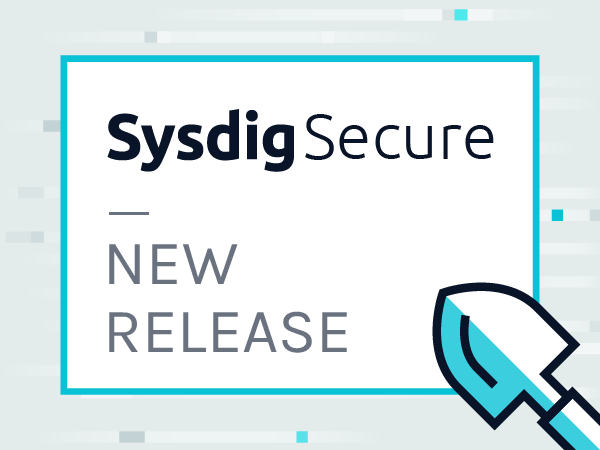We’ve been busy at work over the winter adding new functionality to Sysdig Secure and wanted to round up some of the features we released over the holiday season and in first month of the year. There are three main themes in this February release.
Kubernetes Oriented Security
Many of the new policies and pieces of functionality we introduced revolved around tighter integrations with the orchestrator. When customers get their first containerized application into production they often think about what is needed to protect the container, when their real goal is delivering a stable, secure service. To make it easier to view which policies are protecting hosts, containers, services, cloud regions, etc we’ve add the ability to group policies by scope.
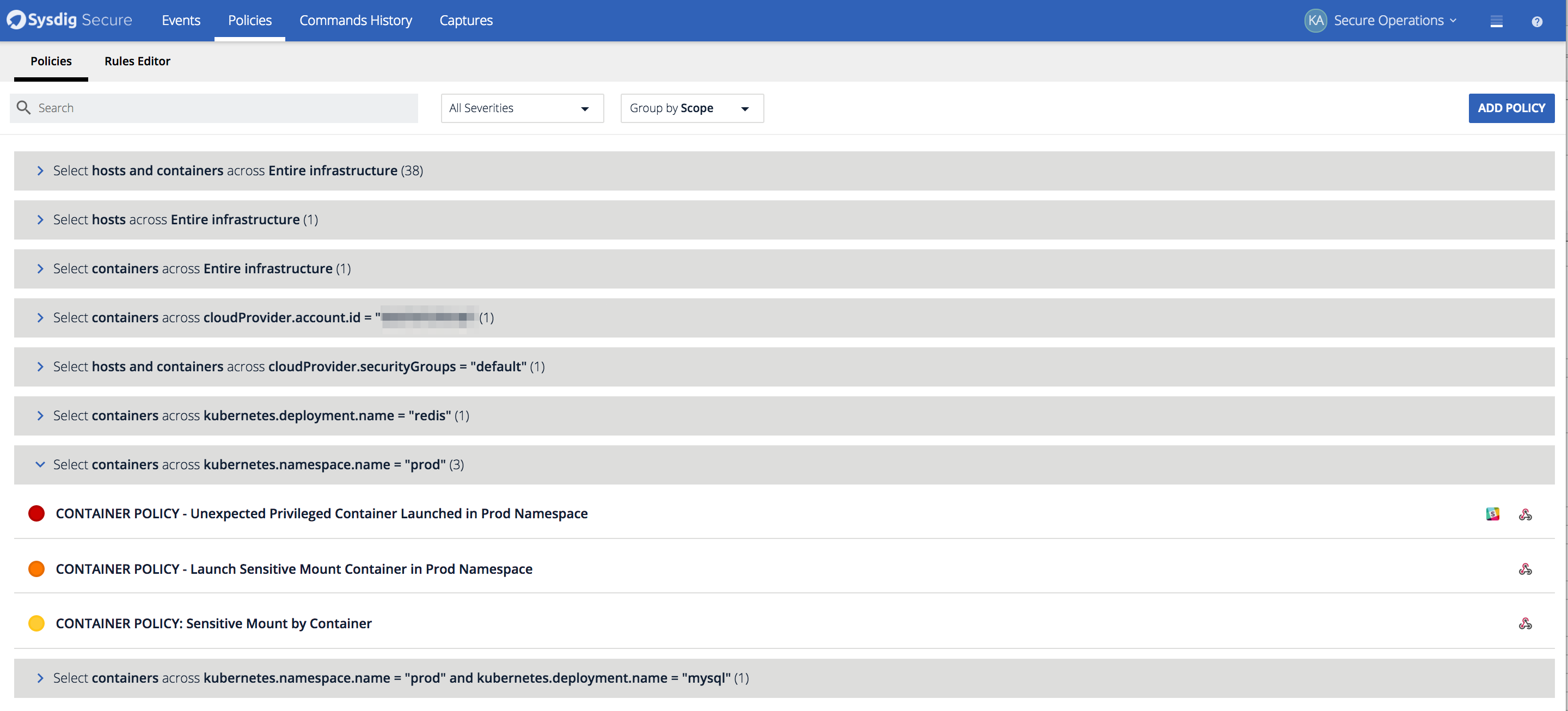 This shows how policies can be viewed based on the scope to which they apply. Here we can see the specific policies configured to protect containers in my prod kubernetes namespace.
Topology Maps
This shows how policies can be viewed based on the scope to which they apply. Here we can see the specific policies configured to protect containers in my prod kubernetes namespace.
Topology Maps
We also released Topology maps for event analysis. Topology maps allow Security Analysts to quickly identify where events have happened on a host or service, and escalate to the proper development and operations teams in charge of those services. The maps are also useful to quickly identify any network dependencies between hosts, containers, and services as well as uncover unexpected connections. Depending on the scope, analysts can see all the entities in a grouping hierarchy, the network connections between them and the count of events that have happened during the timeframe. In the example below we show what topology maps look like from both a physical and logical perspective.
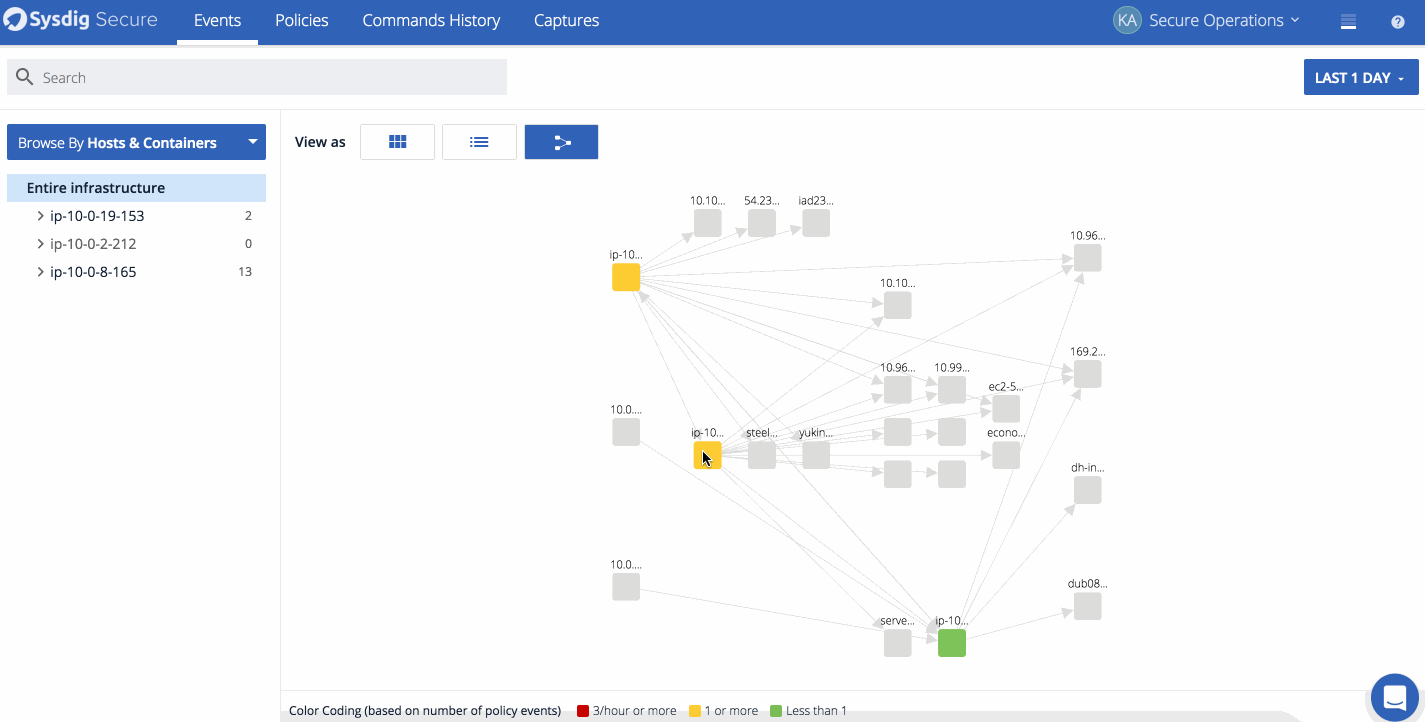 This map first shows the events in kubernetes cluster from a physical perspective, and the a logical view based on the Kubernetes metadata. Notice how much easier it is to detect what applications have events in the service-oriented view.
Overview Dashboard
This map first shows the events in kubernetes cluster from a physical perspective, and the a logical view based on the Kubernetes metadata. Notice how much easier it is to detect what applications have events in the service-oriented view.
Overview Dashboard
Policy events can also be visualized through the overview dashboard within the events page. The overview dashboard gives analysts and administrators a quick overview of which policies, hosts, containers, and deployments had the most events over the selected timeframe. It’s also a great way to get an at a glance summary of how many hosts the agent is installed on and the severity of the events that have occurred.
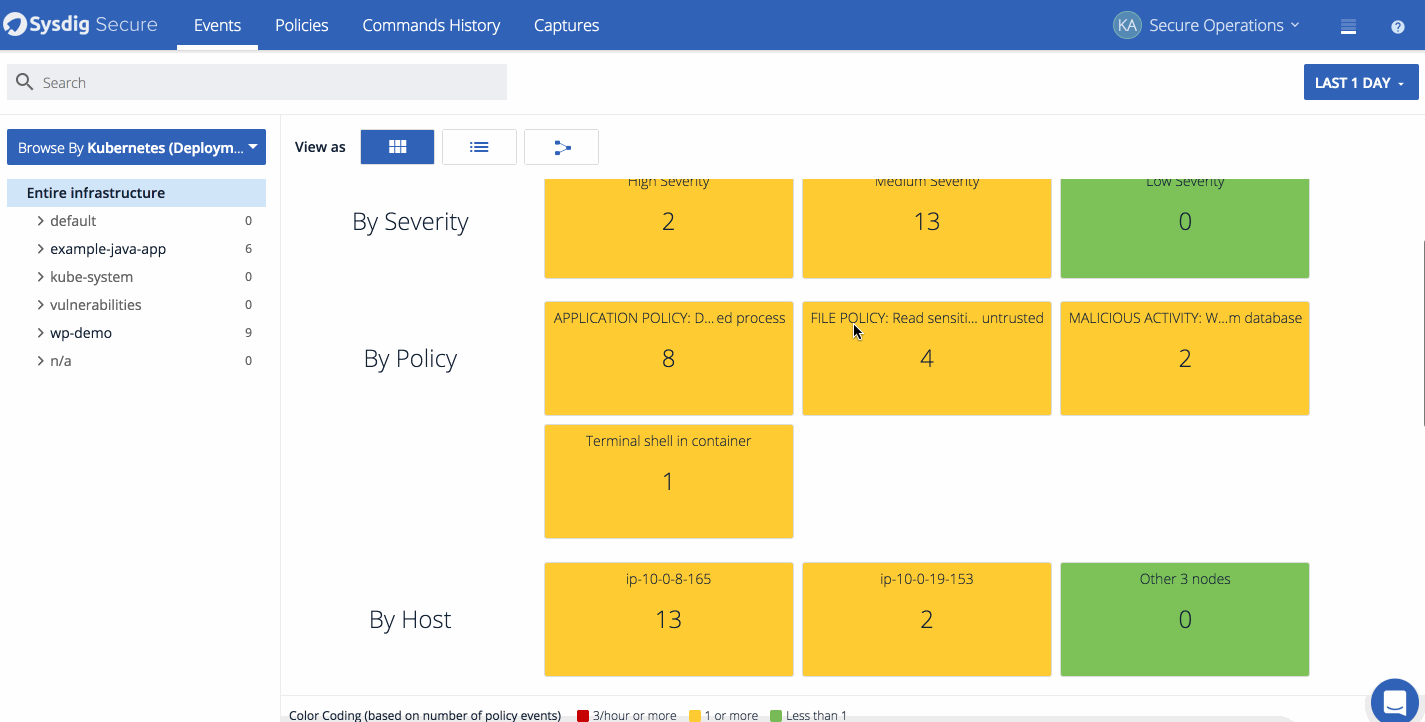
*The overview dashboard is a good way to bridge the gap between your SecOps team and developers. Quickly identify images and applications that have had incidents to set priority with developers. *
New Kubernetes & AWS Policies
We also added two new default policies to cover Kubernetes & AWS API access. The Kubernetes API has been a popular target for
cryptojacking so we added a new policy to detect any connection to the K8s API Server besides those that are explicitly allowed.
- rule: Contact K8S API Server From Container
desc: Detect attempts to contact the K8S API Server from a container
condition: outbound and k8sapiserver and container and not k8s_containers
output: Unexpected connection to K8s API Server from container (command=%proc.cmdline %container.info image=%container.image connection=%fd.name)
priority: NOTICE
tags: [network, k8s, container]
We also added another policy around API services where we’ll detect unexpected attempts from containers to communicate with the EC2 Instance Metadata Service.
- rule: Contact EC2 Instance Metadata Service From Container
desc: Detect attempts to contact the EC2 Instance Metadata Service from a container
condition: outbound and fd.sip="169.254.169.254" and container and not ec2metadatacontainers
output: Outbound connection to EC2 instance metadata service (command=%proc.cmdline connection=%fd.name %container.info image=%container.image)
priority: NOTICE
tags: [network, aws, container]
New Policy Editor
We’ve made it easier for users to bring their existing falco rules and add new rules to Sysdig Secure by adding a rules editor in the Sysdig Secure interface. Just copy in any custom rule, save it, and it will be added to the default ruleset and available within the policy editor.
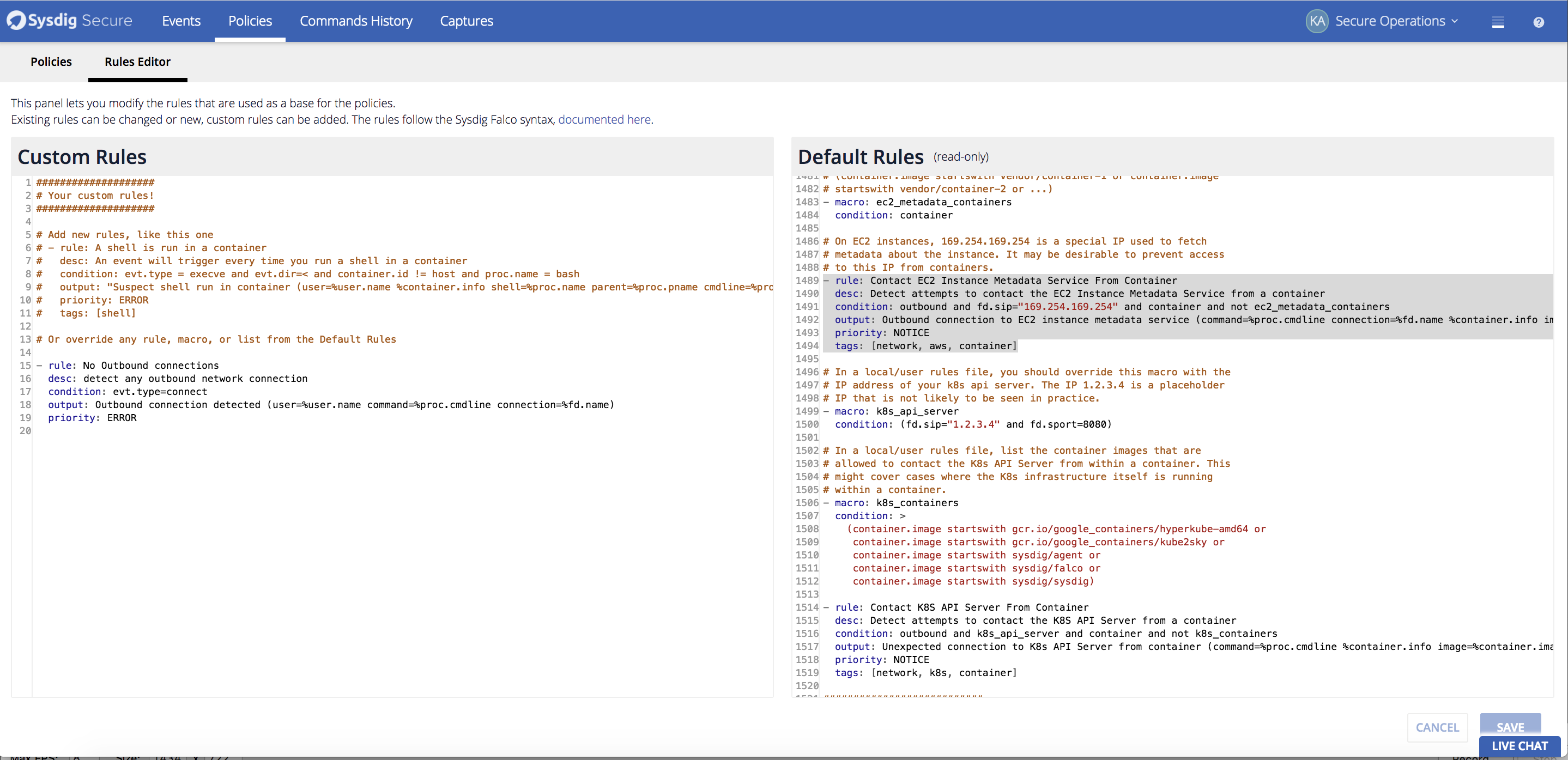
*Quickly add a new rule to your default falco rule set directly within the UI. *
Enterprise Integrations – SSO authentication & new notification channels
Single Sign On Authentication We wanted to streamline your user experience by releasing Single Sign On (SSO) for Sysdig Secure.
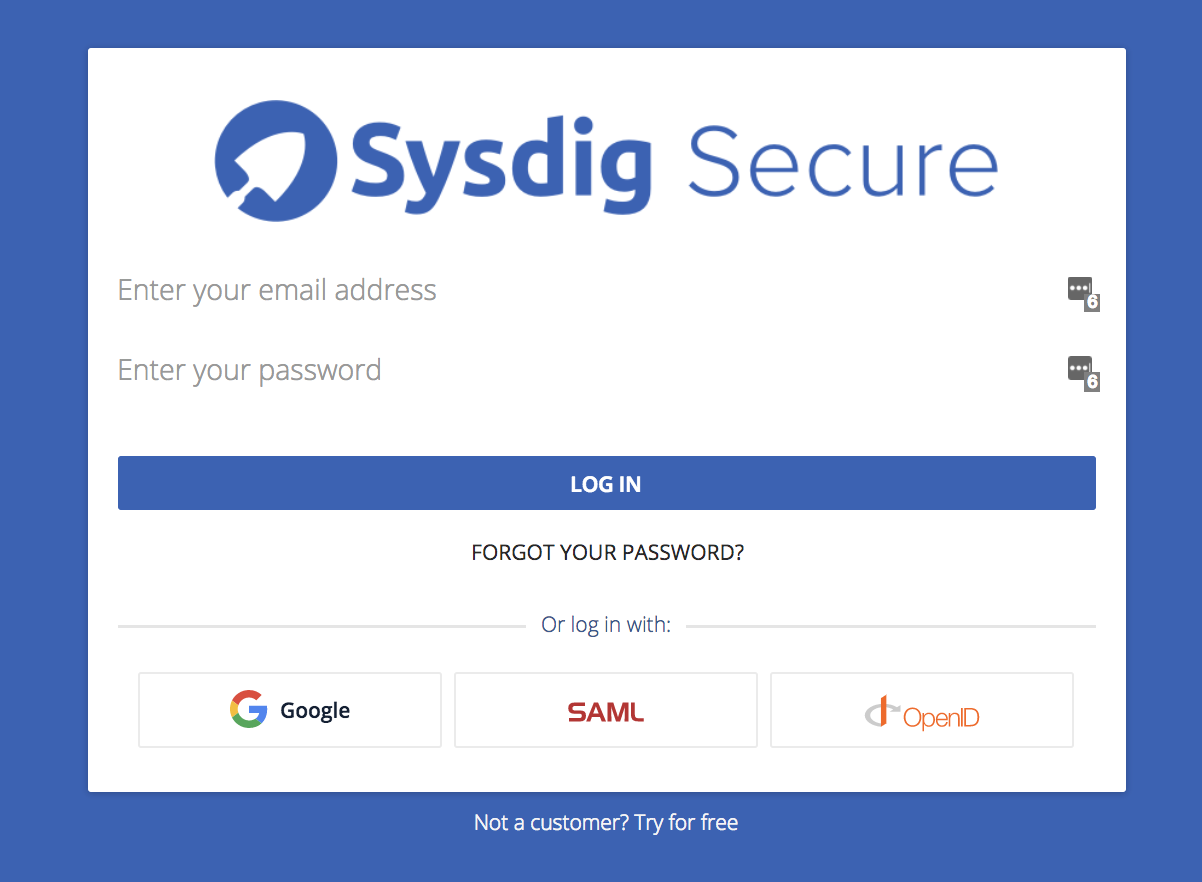
Our SSO solution provides support for the most common methods of SSO, across both our cloud offering and our on-premise software offering:
- Google Authentication
- SAML
- OpenID (Cloud)
- LDAP (On-premise)
Find more details on how to configure
SAML and
OpenID.
New Notification Channels
We’ve also added support for new notification channels as well as webhooks to route any event to a Incident Management ticketing system, or some your SIEM of choosing.
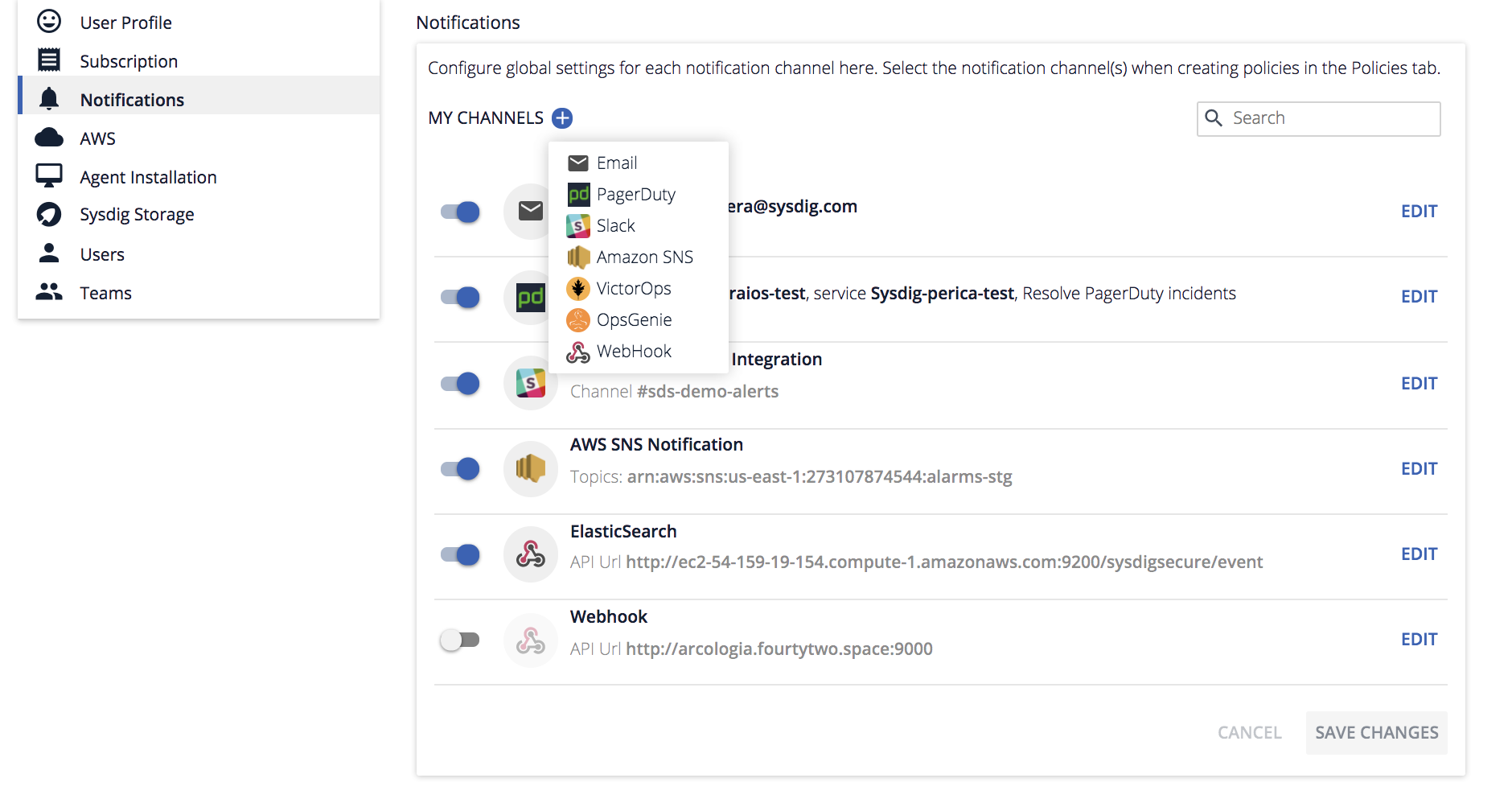
 This shows how policies can be viewed based on the scope to which they apply. Here we can see the specific policies configured to protect containers in my prod kubernetes namespace.
Topology Maps
We also released Topology maps for event analysis. Topology maps allow Security Analysts to quickly identify where events have happened on a host or service, and escalate to the proper development and operations teams in charge of those services. The maps are also useful to quickly identify any network dependencies between hosts, containers, and services as well as uncover unexpected connections. Depending on the scope, analysts can see all the entities in a grouping hierarchy, the network connections between them and the count of events that have happened during the timeframe. In the example below we show what topology maps look like from both a physical and logical perspective.
This shows how policies can be viewed based on the scope to which they apply. Here we can see the specific policies configured to protect containers in my prod kubernetes namespace.
Topology Maps
We also released Topology maps for event analysis. Topology maps allow Security Analysts to quickly identify where events have happened on a host or service, and escalate to the proper development and operations teams in charge of those services. The maps are also useful to quickly identify any network dependencies between hosts, containers, and services as well as uncover unexpected connections. Depending on the scope, analysts can see all the entities in a grouping hierarchy, the network connections between them and the count of events that have happened during the timeframe. In the example below we show what topology maps look like from both a physical and logical perspective.
 This map first shows the events in kubernetes cluster from a physical perspective, and the a logical view based on the Kubernetes metadata. Notice how much easier it is to detect what applications have events in the service-oriented view.
Overview Dashboard
Policy events can also be visualized through the overview dashboard within the events page. The overview dashboard gives analysts and administrators a quick overview of which policies, hosts, containers, and deployments had the most events over the selected timeframe. It’s also a great way to get an at a glance summary of how many hosts the agent is installed on and the severity of the events that have occurred.
This map first shows the events in kubernetes cluster from a physical perspective, and the a logical view based on the Kubernetes metadata. Notice how much easier it is to detect what applications have events in the service-oriented view.
Overview Dashboard
Policy events can also be visualized through the overview dashboard within the events page. The overview dashboard gives analysts and administrators a quick overview of which policies, hosts, containers, and deployments had the most events over the selected timeframe. It’s also a great way to get an at a glance summary of how many hosts the agent is installed on and the severity of the events that have occurred.
 *The overview dashboard is a good way to bridge the gap between your SecOps team and developers. Quickly identify images and applications that have had incidents to set priority with developers. *
*The overview dashboard is a good way to bridge the gap between your SecOps team and developers. Quickly identify images and applications that have had incidents to set priority with developers. *
 *Quickly add a new rule to your default falco rule set directly within the UI. *
*Quickly add a new rule to your default falco rule set directly within the UI. *
 Our SSO solution provides support for the most common methods of SSO, across both our cloud offering and our on-premise software offering:
Our SSO solution provides support for the most common methods of SSO, across both our cloud offering and our on-premise software offering:



